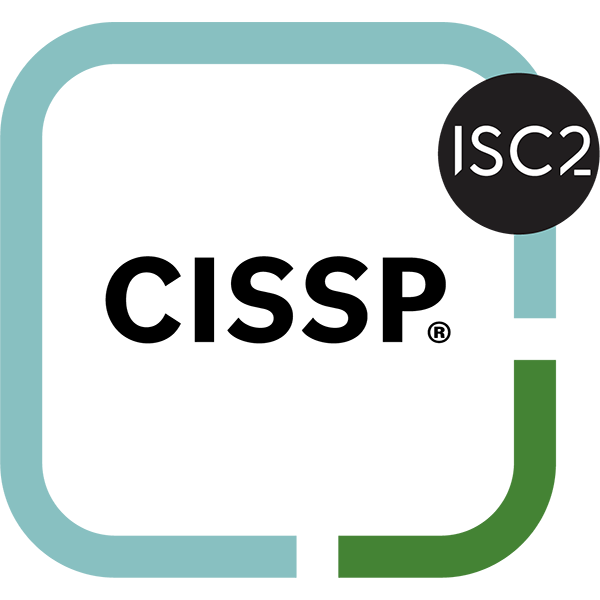CISSP

| Formats: | Blended |
| Online | |
| Onsite | |
| Part-time | |
| Level: | Advanced |
| Prerequisites: | |
| Recommended Knowledge | |
| Strong understanding of IT and cybersecurity concepts, principles, and practices | |
| Prior foundational knowledge in networking, security, and IT infrastructure | |
Formats: We offer our training content in a flexible format to suit your needs. Contact Us if you wish to know if we can accommodate your unique requirements.
Level: We are happy to customize course content to suit your skill level and learning goals. Contact us for a customized learning path.
Certified Infomation Systems Security Professional (CISSP)
The Certified Information Systems Security Professional (CISSP) is a globally recognized certification in the field of information security. It validates a professional's ability to effectively design, implement, and manage a best-in-class cybersecurity program. With a CISSP, you demonstrate your knowledge, advance your career, and become a member of a community of cybersecurity leaders.
CISSP is a distinguished accreditation because it covers a vast range of critical topics in depth across eight domains of information system security knowledge. These include security and risk management, asset security, security architecture and engineering, communication and network security, identity and access management, security assessment and testing, security operations, and software development security.
But why choose our training course for your CISSP journey?
We understand that passing the CISSP exam isn’t about memorization; it’s about understanding the broader concepts and principles in information security. That's why our training course is designed to help you grasp complex security concepts through a mix of theoretical knowledge and practical exercises.
Our comprehensive course offers personalized coaching from certified and experienced instructors who are dedicated to your success. We leverage innovative teaching methodologies and provide you with exclusive study materials, practice tests, and a unique learning platform to track your progress.
What sets us apart is our commitment to giving you the best chance to pass the CISSP exam. Our student-centered approach, combined with interactive sessions and real-world scenarios, will not only prepare you for the exam but also equip you with practical skills to excel in your career.
Invest in yourself and your future in cybersecurity. Join our CISSP training course today and pave your path to becoming a certified information systems security professional.
Course Outline
- Domain 1: Security and Risk Management
- Understand and apply concepts of confidentiality, integrity and availability
- Evaluate and apply security governance principles
- Determine compliance requirements
- Understand legal and regulatory issues that pertain to information security in a global context
- Understand, adhere to, and promote professional ethics
- Develop, document, and implement security policy, standards, procedures, and guidelines
- Identify, analyze, and prioritize Business Continuity (BC) requirements
- Contribute to and enforce personnel security policies and procedures
- Understand and apply risk management concepts
- Understand and apply threat modelling concepts and methodologies
- Apply risk-based management concepts to the supply chain
- Establish and maintain a security awareness, education, and training program
- Domain 2: Asset Security
- Identify and classify information and assets
- Determine and maintain information and asset ownership
- Protect privacy
- Ensure appropriate asset retention
- Determine data security controls
- Establish information and asset handling requirements
- Domain 3: Security Architecture and Engineering
- Implement and manage engineering processes using secure design principles
- Understand the fundamental concepts of security models
- Select controls based on systems security requirements
- Understand security capabilities of information systems (e.g., memory protection, Trusted Platform Module (TPM), encryption/decryption)
- Assess and mitigate the vulnerabilities of security architectures, designs, and solution elements
- Assess and mitigate vulnerabilities in web-based systems
- Assess and mitigate vulnerabilities in mobile systems
- Assess and mitigate vulnerabilities in embedded devices
- Apply cryptography
- Apply security principles to site and facility design
- Implement site and facility security controls
- Domain 4: Communication and Network Security
- Implement secure design principles in network architectures
- Secure network components
- Implement secure communication channels according to the design
- Domain 5: Identity and Access Management (IAM)
- Control physical and logical access to assets
- Manage identification and authentication of people, devices, and services
- Integrate identity as a third-party service
- Implement and manage authorization mechanisms
- Manage the identity and access provisioning lifecycle
- Domain 6: Security Assessment and Testing
- Design and validate assessment, test, and audit strategies
- Conduct security control testing
- Analyze test output and generate reports
- Conduct or facilitate security audits
- Domain 7: Security Operations
- Understand and support investigations
- Understand the requirements for investigation types
- Conduct logging and monitoring activities
- Securely provisioning resources
- Understand and apply foundational security operations concepts
- Apply resource protection techniques
- Conduct incident management
- Operate and maintain detective and preventative measures
- Implement and support patch and vulnerability management
- Understand and participate in change management processes
- Implement recovery strategies
- Implement Disaster Recovery (DR) processes
- Test Disaster Recovery Plans (DRP)
- Participate in Business Continuity (BC) planning and exercises
- Implement and manage physical security
- Address personnel safety and security concerns
- Domain 8: Software Development Security
- Understand and integrate security in the Software Development Life Cycle (SDLC)
- Identify and apply security controls in development environments
- Assess the effectiveness of software security
- Assess the security impact of acquired software
- Define and apply secure coding guidelines and standards